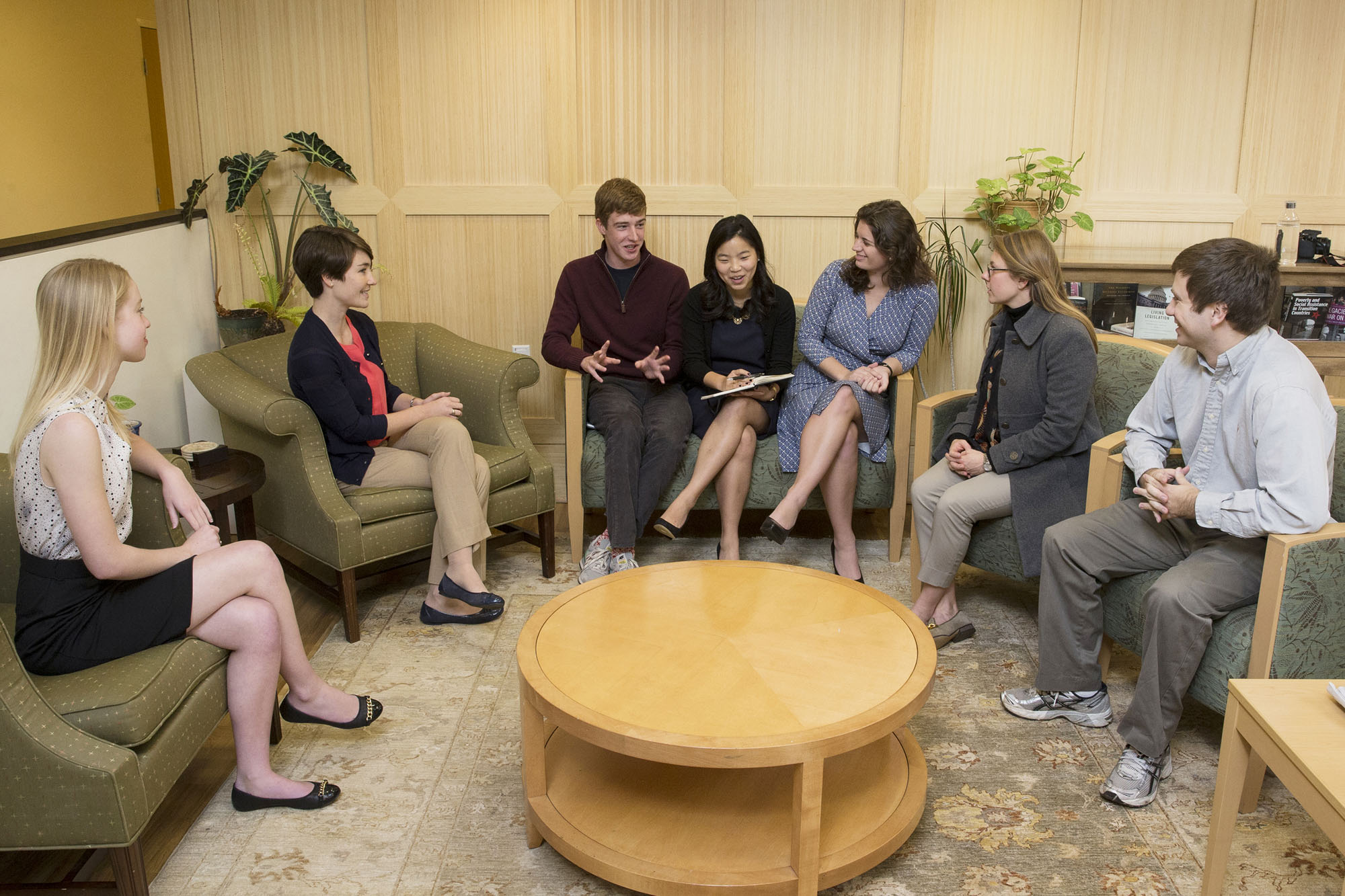The time and money needed to create new outreach initiatives often are in short supply at local non-profits. One group of University of Virginia graduate students is working to ease that burden.
FCG Consulting, formerly known as the Formative Change Group, is a pro-bono policy and strategy consulting agency run entirely by Master of Public Policy candidates at the Frank Batten School of Leadership and Public Policy. Their work gives students an opportunity to sharpen their policy skills and offer targeted help to local agencies.
“We’ve found that our clients are very receptive to the kind of skills-based work we do, and I think that they appreciate that we’re specialized policy students,” said FCG’s executive director, Michelle Cho. “We’re not just general consultants. Our academic curriculum is focused on the kind of public policy that is vital to their work.”
Since its creation in 2012, FCG has grown rapidly, both in membership and in the number of projects it takes on each semester. Its 34 student members are working with six local non-profits on seven different projects.
“The projects we complete are focused on our policy skills, so we try to steer away from work that our clients already have volunteers doing,” said Corydon Baylor, FCG’s chair of alumni relations and special events. “For example, their regular volunteers collect and administer surveys, and then we’ll analyze it for them and make actionable policy recommendations based on what we find.”
Often this means taking large amounts of qualitative data and finding a quantitative way to measure and display it. In the spring, FCG did this to great effect for the Thomas Jefferson Area Coalition for the Homeless. In collaboration with the agency’s staff, students designed and analyzed a new 53-question survey for the coalition’s clients that gathered more information about their lives and backgrounds, with a particular emphasis on Charlottesville’s unsheltered population.
“That [survey] data was qualitative when it came in, but we made it quantitative so we could work with it. Then we used data visualization to present the story it told,” Baylor said.
The coalition’s executive director, Kaki Dimock, said that FCG has been instrumental in the data analysis portion of their new survey and that their work helps the agency’s staff confirm emerging trends.
“The data the FCG students collected for our homelessness census serves as the backbone of [the agency’s] annual data dashboard,” she said. “FCG improved our data quality significantly and created data collection tools that will serve us in the future, improving our long-term capacity, which is a very meaningful contribution.”
FCG’s other current clients include the Virginia Discovery Museum, Madison House, the International Rescue Committee, Meals on Wheels and Habitat for Humanity.
Some projects, like FCG’s work with the Virginia Discovery Museum, tap into the students’ data analysis skills as well as their experience with research and communications. FCG has spent the last three months compiling research and data on the importance of play-based learning and inclusive environments. Now, they’re using that information to help the museum build a policy context for the re-launch of its new mission and core values.
They’ve also worked with the museum staff to create a new social media campaign that better communicates the accessibility of the museum’s programs to underserved families in the Charlottesville-Albemarle community.
“FCG provided a national research context for our local observations,” Janine Dozier, the museum’s interim executive director, said. “Their work will be critical in driving participation in our programs and events among the children in our community who most need enrichment in literacy, science and the arts.”
Although all their work is done pro-bono, many FCG members feel that each new project they tackle comes with valuable rewards. Their work gives them hands-on experience and a real-life context for their studies at Batten.
For first-year master’s student Madeline Merrill, one of the most rewarding parts of her work with the Thomas Jefferson Area Coalition for the Homeless has been discovering the underlying intricacies of broad public policy initiatives and the work nonprofits in the area are doing to coordinate and tackle difficult problems.
“I just didn’t realize that there were so many ways that someone can be vulnerable,” she said. “There are so many tiers to that one word, ‘homeless.’ I learned that we often have these all-encompassing words in policy definitions, but we have to dig deeper and define the many social metrics behind them.”
Several of FCG’s current clients, including the homeless coalition and the Virginia Discovery Museum, have already signed on for new projects next semester and the rest of the docket is filling up fast.
“We’ve cemented about 70 percent of the projects for the spring, but we’re still reaching out to more new organizations,” Cho said. “We’d also like to do another internal project where we host a policy-based workshop. We had one in the spring this year, and that was a great success.”
FCG’s last internal project was a policy workshop on rethinking community race relations. In April, the group invited students and members of the Charlottesville community to listen to expert speakers and spend the evening generating solutions from a design thinking perspective. They also asked each participant to fill out a survey after the event.
“Now we’re working on a one-pager from the data we collected to give to our clients and other non-profits that sums up what we learned from the community that night,” Cho said.
Moving forward, FCG hopes to continue expanding its clientele and take on more initiatives that help the community as a whole.
“We always keep in mind that FCG stands for Formative Change Group,” Baylor said. “The social responsibility of that name is very important to us.”
Media Contact
Article Information
December 17, 2015
/content/policy-service-batten-student-consultants-lend-hand-non-profits-0

